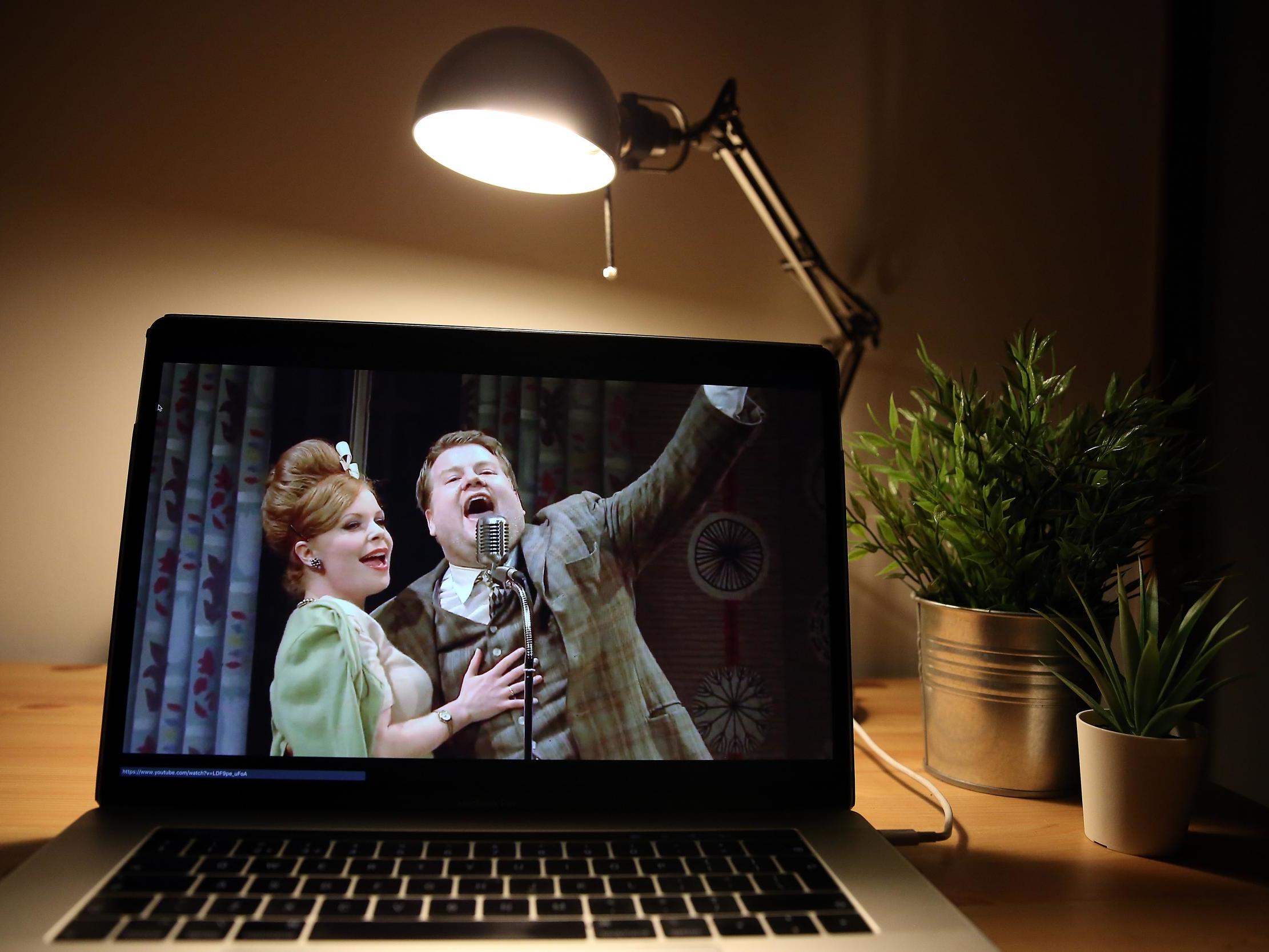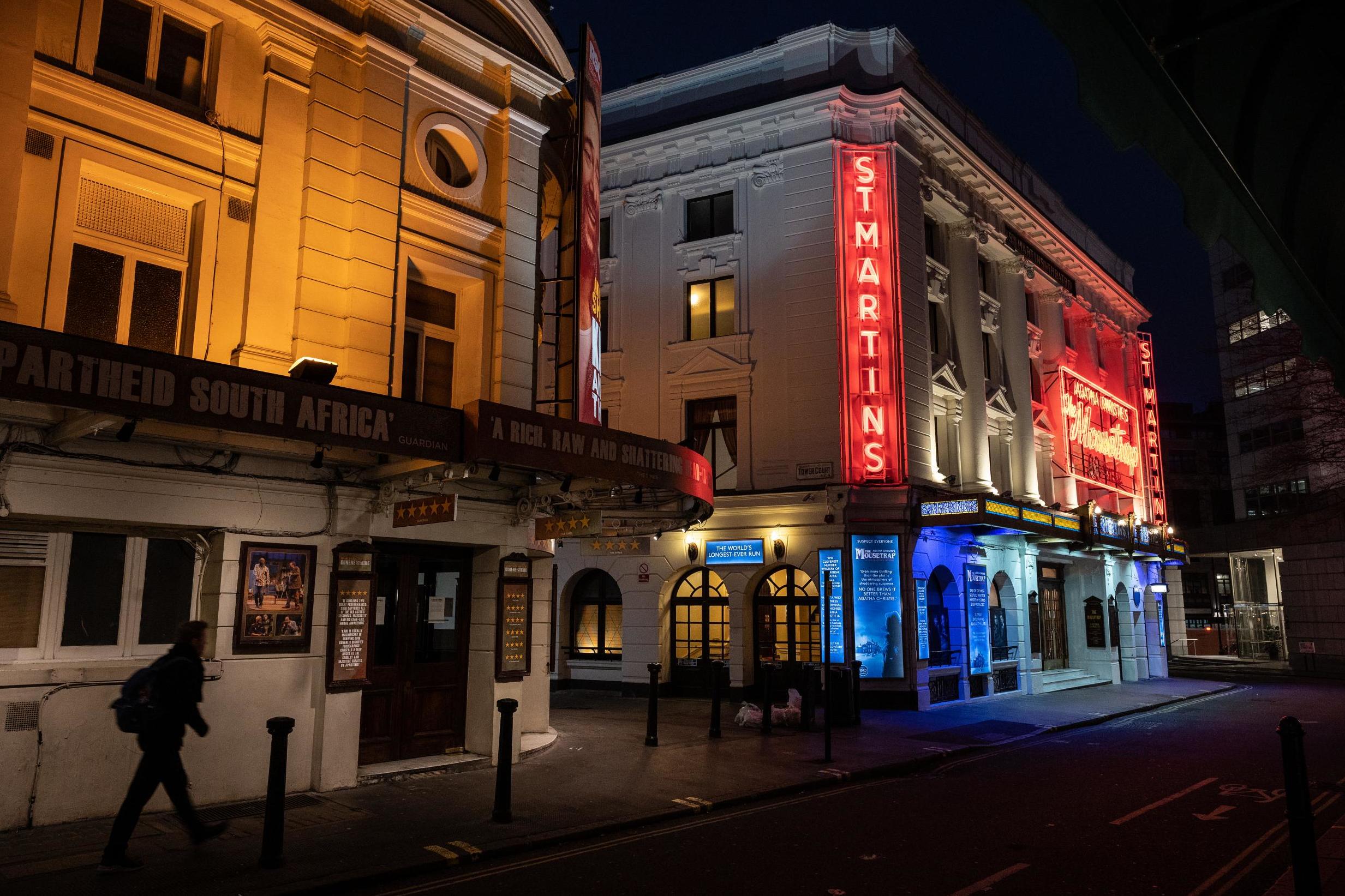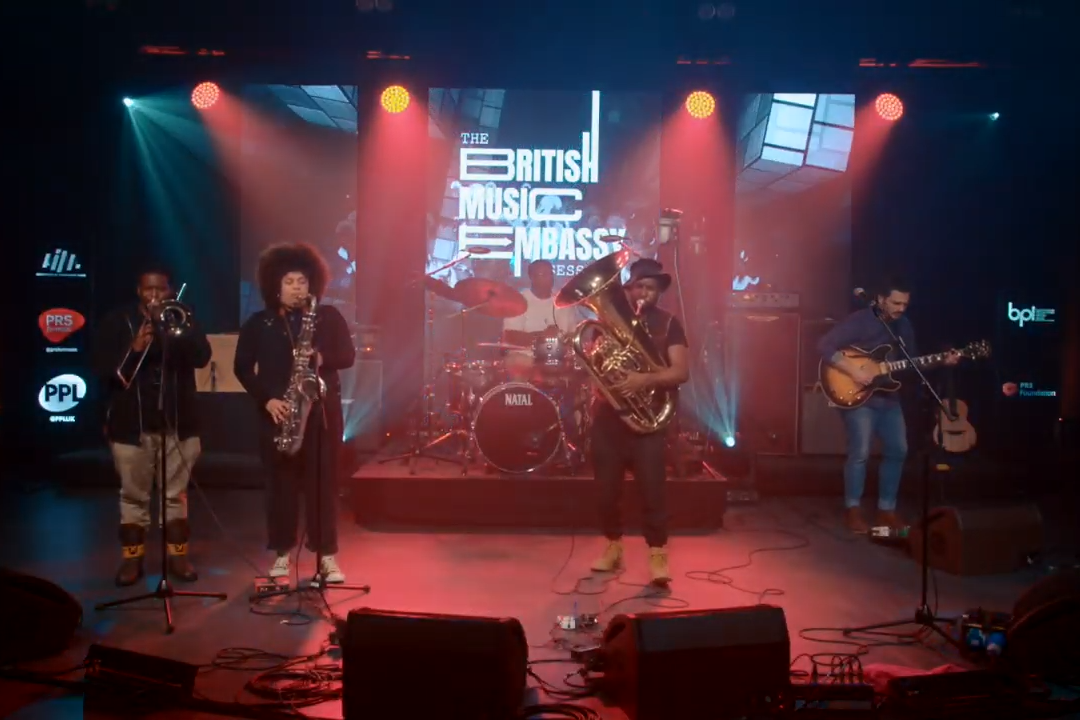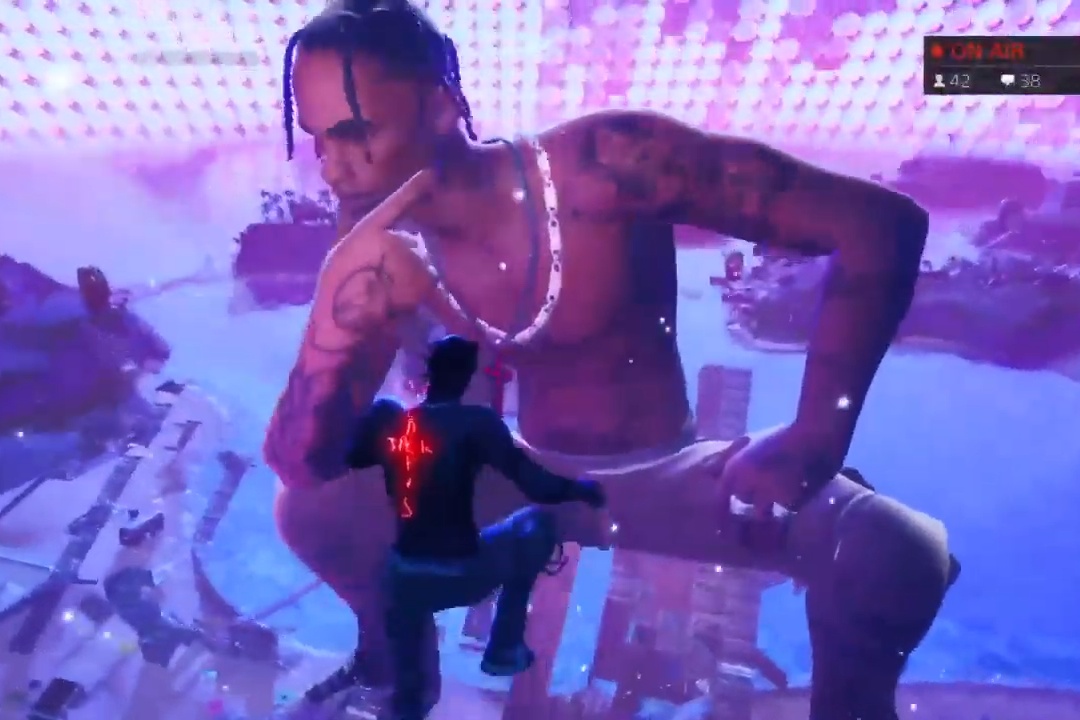Will coronavirus change the way we consume culture forever?
Watching theatre from your sofa and taking a virtual gallery tour... Culture has adapted but long-term are we prepared to pay for a live-streamed event when we are so used to free content online? By David Barnett


The theatres are dark. The cinemas are closed. The art galleries are shuttered, the gig venues are silent, and the festival fields lie fallow. However, culture finds a way. Over the past eight weeks those behind entertainment across the spectrum have had to innovate to bring events to people’s homes via digital and online platforms.
Cold War Steve — real name Christopher Spencer — is a popular Twitter presence thanks to his photographic collages featuring public figures and celebrities that are both surreal, satirical, and sometimes unsettling. He was commissioned by the Birmingham Museum and Art Gallery to create three original works for them, the first of which, Benny’s Babbies, was due to be unveiled on April 18. Obviously by then, the museum had been forced to close. And the planned reveal of the two further Cold War Steve works, in May, has also been postponed.
Instead, the launch of the artwork was held online with written contributions from some of the people featured in the piece, including comedian Joe Lycett and writer Kit de Waal, with words from Spencer about how he had to adapt the planned physical exhibition to be online instead. Emalee Beddoes-Davis, the curator of Modern and Contemporary Art at the museum and gallery, says: “Seeing the project reach millions, getting a few laughs and making people feel proud of the city and its collection is an extremely rewarding experience for all of us at the museum when we cannot open our doors to the public. Personally, I've found it very moving.”
Maintaining a presence and a service is important to venues such as the Birmingham Museum and Art Gallery; the pandemic isn’t just a case of closing the doors and waiting until it’s all over. It is losing £100,000 income every single week while closed, and it is vital it gets people back through the doors when the crisis is over, and in the meantime, like so many other venues and organisations, it is asking for donations through portals such as JustGiving.com to ensure its survival.
For the museum, it’s something of a case of seeing it out and surviving in the meantime until it can re-open with its planned exhibitions. But for those participating and organising one-off events or music tours, things are perhaps even more precarious.
Big-ticket shows like Glastonbury — which would have celebrated its 50th anniversary this June — have been cancelled. As has SXSW, a major music industry event held every March in Austin, Texas, which is attended not just by performing artists but has a major industry presence. It is where new talent is spotted, deals are signed and careers are made.

So its cancellation was a huge blow especially for UK-based talent that was planning to attend. Instead, on March 18, a live-stream event was organised to showcase some of the artists who were due to attend SXSW under the label Jazz re:freshed, with artists including Noya Rao, Theon Cross, Daniel Casimir and more. They played 30-minute sets from the Mill Studios in London, overseen by audio-visual company MQA to stream the performances worldwide to fans and industry figures.
Mike Jbara, CEO of MQA, says: “Livestreaming of shows, both pre-recorded and live, is everywhere. It’s been fascinating to see how ‘viewing by appointment’ of archived concerts has proved so popular; eg, nugs.net streams a weekly schedule of gigs from its artist roster – the first of Metallica’s weekly concerts attracted two million views on one streaming platform alone.
“While it might feel like a fad or necessity given the lockdown, consumer sentiment suggests a willingness to pay for livestreams at a rate higher than those willing to pay for a music streaming service. That appetite holds promise.
The question is, once this is all over — and whether it will be over in the way that most of us hope — how will our new ways of consuming culture knock on to life after coronavirus?
“At the same time, only a minority consider a livestream to be an adequate substitute for the experience of being at the venue. In our conversations with artists, managers and agents, we continue to hear scepticism regarding the revenue opportunity available to established artists. Except for the occasional DIY artist story, the most visible livestream stories are benefits, free events, or tip jar, aka pay-what-you-want events.”
Necessity being the mother of invention and all, the National Science and Media Museum in Bradford, West Yorkshire, has also hit upon a way to engage the many young people it would normally have welcomed through its doors over the Easter break. The museum has a big focus on digital culture and videogaming especially, and has nicely piggybacked on the game that’s really caught the lockdown imagination: Animal Crossing. The museum has created a section on its website that allows players to upload directly into the game simulations of items and exhibits from the museum’s collections.

Kathryn Penny, director of the Yorkshire Games Festival, which takes place in Bradford every February, hosted by the National Science and Media Museum, said: “While we’re in lockdown it’s great to be able to bring the Science Museum Group Collection to people in new and innovative ways. One of our key areas of focus at the museum is videogaming and it’s exciting to see the museum brought to life in a hugely popular game like Animal Crossing. Games like this have many learning benefits for people of all ages and can also be a great source of comfort, especially at times like these.”
It might be that we’re still in a phase where we’re finding the whole idea of streaming concerts into our living rooms and attending virtual galleries something of a novelty. The question is, once this is all over — and whether it will be over in the way that most of us hope — how will our new ways of consuming culture knock on to life after coronavirus?

Becca Stevens is an American singer-songwriter who, with her gigging curtailed, has taken to her Patreon platform to offer videos of her performing, holding interactive talks and classes and reading her personal writings. She says: “I tend to be a pretty optimistic person, but I think if we assume that once this passes ‘things will go back to normal’ we are kidding ourselves. People in all walks of life, not just the arts, will work more from home moving forward, partly out of necessity, but also because a lot of folks who I’ve spoken to, myself included, may have restructured their lives in a way that they prefer.
“I never had the time before to settle into a teaching schedule. I’ve always been too busy coming and going in and out of the country. But now it’s the best way for me to pay my rent, and I’m enjoying it. It’s giving me an opportunity to connect with people during a time when I crave human connection, and it works a muscle in my brain that is very different from my touring/performing skill set. Quarantine anxieties aside, I must admit I feel more balanced, and more connected with my self and my husband.”
Performing live is her bread and butter and she hopes for a swift return to that. Stevens says: “The lag is unsettling, and the silence at the end of the songs is deafening. I shudder to think of myself getting used to either! Venues and agencies will take a huge hit from this. Some won’t make it. But those who do will succeed because they adapted. Adaptation during any global experience is inevitable.”
This pandemic is a great equaliser, everyone’s in the same boat. So honest, genuine and creative posts speak much more to people than high production, exclusive content
Mike Jbara agrees, saying: “The data suggests it will be quite a while before fans are ready and comfortable in large crowds. It is likely that online shows will need to succeed or fail as a proposition on their own before future events are back in full swing. If they are to succeed, livestreams will need to be valued as a distinct experience and not as an add-on.
“People attend shows for the experience, not for the best view or the best sound. Live music is exciting because great performers create one-of-a-kind art no matter how familiar the set list or repertoire. However, our experience with MQA livestreaming indicates that, when done right, there is a market for the remote viewing and listening of a live concert – people describe an intimacy and awareness of detail that otherwise gets lost. That experience could be valuable to dedicated fans who attend live shows and, importantly, fans who cannot attend either because of means or location.”
There have been slightly unexpected effects of the crisis as well. Take the Dublin rock band The Coronas… their name obviously evokes the word on everyone’s lips at the moment. All by accident, of course; the band has been going some time, and was due to be releasing their sixth album backed up by a huge American tour. Which is, of course, off.
Singer and guitarist Danny O’Reilly is philosophical, though. He says: “From a band perspective, you have to adapt and see what works, trying to be creative together while apart in isolation has bands thinking outside the box and I think music fans are more engaged and can relate to how the bands deliver content.

”This pandemic is a great equaliser, everyone’s in the same boat. So honest, genuine and creative posts speak much more to people than high-production, exclusive content. Online shows and streamed events will be much more common, regardless of when things get back to normal.”
The key to it all is whether we’re prepared to pay for a live-streamed event in the same way we would for one we are going to attend. Going to a gig, or a book reading, or the theatre, is an emotionally charged, sometimes visceral experience. You pay for a ticket, you leave your home, enter into another space where you are entertained. You may go for drinks, or a meal, with friends and family. It is for those who enjoy live events of any kind, money well spent.
The American music magazine Billboard has teamed with Neilsen Music to crunch the numbers, releasing reports every two weeks too see how our engagement with culture is being affected by the crisis. In its first release they noted “the barriers between home life and work life blurring” and found that “people reported spending 60 per cent more time with music and other forms of remotely accessed entertainment”, with almost a quarter of the US population adding new subscription services.
In its latest study, however, it noted that the initial surge in streaming services had begun to level off, most likely as people began to take stock of their finances and worry about how long lockdown was going to last. The report says: “At first, households with kids were worried about having everyone at home and had more interest in playlists for working from home and music videos for kids. Now that they’re feeling less stressed and have figured out a routine to balance home and work life in the new normal, they’re relying less on these.”
The report also suggests that “consumers overall, especially those with children, are less likely to rush back to live events within a month of a vaccine or treatment being available. As teens realise a quick return to live events is not likely, they are warning up to virtual concerts.”
For artists and creatives to make money from live-streaming, there will have to be money exchanging hands. And the question is whether we are so used to free content online that we’re prepared to pay for it in the same way that we would pay for the real live experience. Sounding a note of hope, Becca Stevens concludes: “But music will prevail, it always has, and always will. My hope is that the appreciation for music and the arts and for human connection will grow because of this. And for the many people that are afraid to go out to shows, there are twice as many who can’t wait to get out of their houses and support one another again, and bask in the healing force of music.”
Join our commenting forum
Join thought-provoking conversations, follow other Independent readers and see their replies
Comments